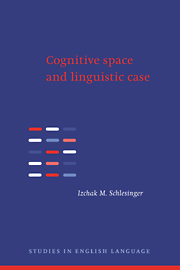10 - Retrospect and prospects
Published online by Cambridge University Press: 20 October 2009
Summary
… it's puzzling work, talking is.
Mr. Tulliver in George Eliot's The Mill on the FlossIn this concluding chapter I summarize some of the main themes, the threads that run through the book, as it were; then I briefly discuss the question of where we go from here, suggesting some of the issues that will have to be investigated next.
The traditional view
The approach to cases – semantic roles, thematic relations, or whatever one chooses to call them – advocated in this book presents a challenge to the customary approach, which views cases as directly reflecting the categories in human cognition (Chapter 1, Section 1). But cognitive psychology does not tell us which categories function in cognition, and linguists have proceeded with what Cruse (1973: 11) has called “cheerful intuitivism” in positing case categories. Cognitive relations realized in language are legion (Chapter 8, Section 1.2), and the problem is therefore which of these should be accepted into the fold and which should be excluded, or else subsumed under a wider category. In the absence of a principled way of defining cases, there emerged a complete lack of agreement as to the number of cases required and their definitions (Chapter 2, Section 1). Some writers (e.g., Dowty, 1991) feel that the approach of providing a list of cases has now reached an impasse.
Viewing cases as cognitive categories led to another problem. Syntactic categories do not correspond in any simple fashion to cases.
- Type
- Chapter
- Information
- Cognitive Space and Linguistic CaseSemantic and Syntactic Categories in English, pp. 210 - 214Publisher: Cambridge University PressPrint publication year: 1995

